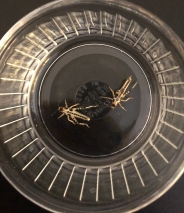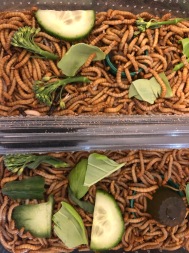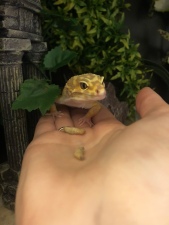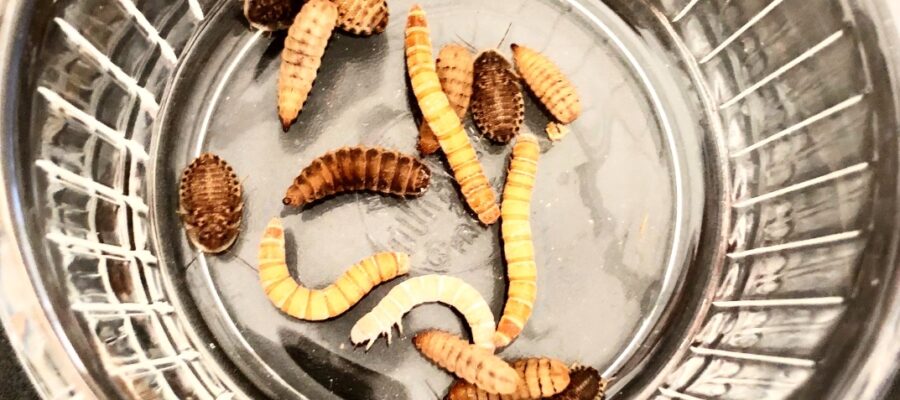Leopard geckos are easy to feed, as long as you don’t mind feeding them live insects only. Here are some things you will need to know if you need to understand the basics of feeding a leopard gecko.

Read my FAQ on leopard gecko feeding here
Read my feeder insect reviews here
If your leopard gecko isn’t eating, check here
I also encourage you to read multiple sources to gather more in-depth information, as it’s important to educate yourself and expand your own understanding of your geckos and their health.
Leopard geckos will not eat any dead insects (many seem to not bother with insects unless they are wriggling and moving) and will not eat a plant-based diet. Some of the most popular insects fed to leopard geckos are:
- Crickets
- Mealworms
- Locusts
- Dubia roaches
- Silkworms
- Phoenix worms/ calci worms
- Waxworms (occasionally)
- Superworms/ morio worms
Nutrients
 Some insects (such as mealworms, and waxworms) have a really low nutritional content and lack the essential vitamins required to keep leopard geckos healthy. It is important to “gutload” the majority of insects at least 24 hours before feeding them to your leopard gecko.
Some insects (such as mealworms, and waxworms) have a really low nutritional content and lack the essential vitamins required to keep leopard geckos healthy. It is important to “gutload” the majority of insects at least 24 hours before feeding them to your leopard gecko.
This means all of the nutrients you feed to the insects will be passed onto your gecko when the insect is eaten.
See: What is Gutloading and why is it important?
You should also dust insects such as mealworms with calcium powder at every feeding, and about twice per week dust the insects with calcium combined with vitamin D3 powder.
See: Which vitamins and supplements do leopard geckos need?
Quantity and Frequency
It is recommended that you feed baby and juvenile leopard geckos on a daily basis, however adults have a slower metabolism, therefore only need feeding every couple of days.
There is some debate over how many insects should be fed to your geckos, but geckos tend to stop eating when they’re full, so trying around 6-8 insects to begin with would be a good start to see the quantity needed per feed, and adjusting if necessary.
Waxworms warning
 It really is true that leopard geckos LOVE waxworms – they are fatty, soft, and absolutely irresistible to leos.
It really is true that leopard geckos LOVE waxworms – they are fatty, soft, and absolutely irresistible to leos.
Some people do not feed these to their geckos at all, and some recommend that these are only used as a treat.
Personally, I try to only feed waxworms if I’m trying to coax my leos out of their hides, or trying to gain their trust, and I would never feed them with a waxworm more than once a week (but in practice, I do this maybe once per month!)
Get Your Free Leopard Gecko Care Checklist!
Are you ready to give your leopard gecko the best care possible? Download our FREE PDF e-book featuring a comprehensive care checklist!
This handy guide covers everything from habitat setup to feeding and health tips, ensuring your gecko thrives.
👉 Download your checklist now!




